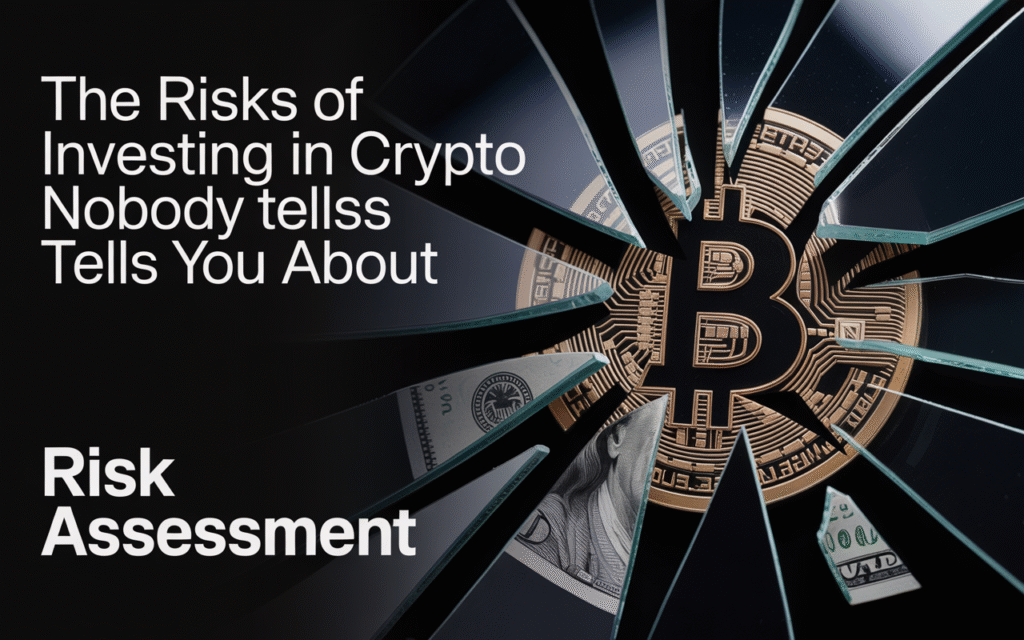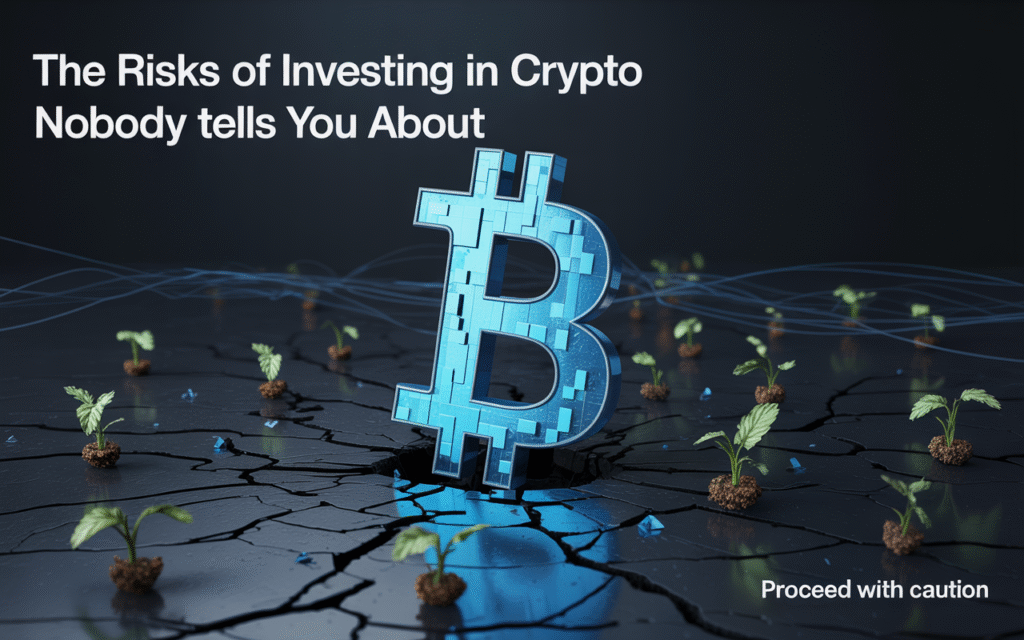
Hey, can we have a real talk about crypto for a second?
I know it feels like everyone is “getting rich” off crypto, and if you’re sitting there watching another dude on TikTok talk about how he made $100K flipping dog coins while you’re trying to pay off your student loans or save for a car, it’s easy to feel like you’re missing out.
The truth? There’s a lot people don’t tell you about the risks of investing in crypto. And I’m not trying to scare you off—crypto is exciting, it’s a big piece of the future, but te lo digo por experiencia, it’s also messy, stressful, and honestly, sometimes it can break your heart if you’re not prepared.
So let’s go over the real risks, in normal people language, so you know what you’re walking into before you throw your hard-earned money in.
1. Crypto Is Wildly Volatile (Like, Really)
Look, I’m not gonna sugarcoat it. One day, you’re up 30%, and you’re feeling like the king of the world. The next day, it drops 40% overnight because Elon Musk tweeted something random, and suddenly your stomach is in knots.
I’ve seen it happen with my friend Kevin in Austin. He put $3,000 into Ethereum at what he thought was “a dip,” then it dipped even harder, and he panicked and sold, locking in a $900 loss. If he had just held, it would’ve recovered months later, but the stress was too much.
Ojo con esto: If you can’t handle seeing your investment drop 50% without freaking out, crypto will be tough.
2. Scams Are Everywhere
I’m not kidding when I say that crypto is like the Wild West sometimes.
There are fake exchanges, pump-and-dump groups on Telegram, shady influencers promoting coins they’ll dump on you, and phishing scams where a single click can drain your wallet.
One of my cousins, Michelle, almost lost $500 when she clicked a “free airdrop” link on Twitter that asked her to connect her wallet. Luckily, she texted me first, and we figured out it was a scam.
Always use trusted apps like Coinbase, Kraken, Gemini, and double-check URLs. Use hardware wallets like Ledger or Trezor if you’re planning to hold.
3. It’s Easy to Get Addicted
This is one people don’t talk about enough.
Checking prices every 15 minutes. Feeling high when it’s green, feeling like trash when it’s red. Crypto can mess with your mental health if you let it.
If you’re someone who struggles with anxiety or you already have financial stress, adding a super-volatile asset to your life might not help. It can turn into gambling if you’re not careful.
4. You Can Lose Everything If You Lose Your Keys
Unlike your bank, there’s no “forgot my password” button in crypto.
If you lose your seed phrase (those 12-24 words when you set up your wallet), your crypto is gone. Forever.
I know a guy in Seattle, Chris, who lost $2,000 worth of Bitcoin because he thought he saved his seed phrase on his phone, then his phone died, and he had no backup.
Te lo digo por experiencia: Write your seed phrase down on paper. Store it somewhere safe. Maybe even two places. Don’t screenshot it, don’t put it on Google Drive.

5. Regulatory Risks Are Real
Crypto laws are changing fast in the U.S. The IRS wants their cut, and you need to report your crypto gains (and losses) on your taxes. Exchanges can get shut down, coins can get delisted, or laws can make trading certain coins illegal.
It’s worth reading Cryptoassets by Chris Burniske if you want to understand the environment better, and you can use apps like CoinTracker to help you track your crypto taxes.
6. Emotional Decision-Making Can Wreck You
You’ll hear people saying “Buy the dip.” Sounds easy, but when the market is crashing, your brain will scream, “Sell before it goes to zero!” It’s human nature to panic sell at the bottom and FOMO buy at the top.
The truth? Crypto investing requires emotional discipline most people don’t naturally have, especially when starting out.
If you’re new, consider dollar-cost averaging (buying small amounts regularly) instead of going all in at once.
7. It’s Not a Get-Rich-Quick Scheme
I know you’ve seen people on Reddit saying, “I turned $500 into $50,000.” Those stories are rare, and most people don’t talk about the losses.
Crypto should be a part of your portfolio, not your entire portfolio. Don’t bet your rent or your grocery money on it.
Like, my friend Lisa in New Jersey, a single mom, started with just $20 a week into Bitcoin while still paying off credit cards and building her emergency fund. She learned, she didn’t stress, and it became a small, manageable part of her financial plan.
What You Can Do Before Investing
✅ Build your emergency fund.
✅ Pay off high-interest debt.
✅ Read and learn (YouTube: Whiteboard Crypto, Coin Bureau).
✅ Start with small amounts you can afford to lose.
✅ Use trusted exchanges, enable 2FA.
✅ Consider a hardware wallet for security.
✅ Prepare for taxes using apps like CoinTracker.
Final Thoughts: Crypto Is Exciting, But Be Smart
Look, I’m not here to tell you “never invest in crypto.” I’m here to say know what you’re getting into.
Crypto is exciting, innovative, and can be a part of your future wealth-building strategy, but it’s also risky, volatile, and unforgiving if you make careless mistakes.
You’re not “late.” The crypto space will keep evolving. You have time to learn, to build a plan, and to enter when you are ready, not because a YouTube guy told you to.
And if you ever feel overwhelmed, take a step back. Crypto will still be here tomorrow.
Take care of your financial basics first, learn before you leap, and remember: You’ve got this.
If you ever want to chat about your crypto plans, your worries, or you just need someone to help you figure out what a “wallet” actually is, hit me up. We’re all learning here, and that’s okay.
